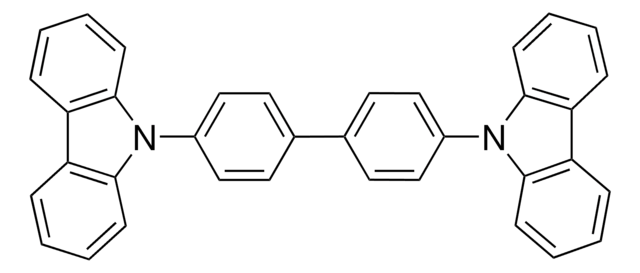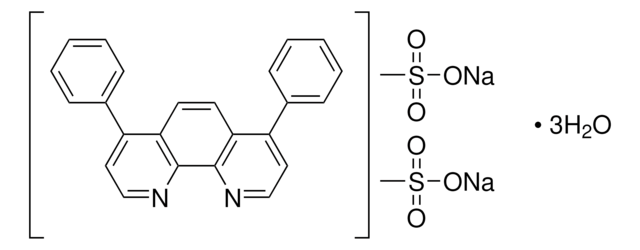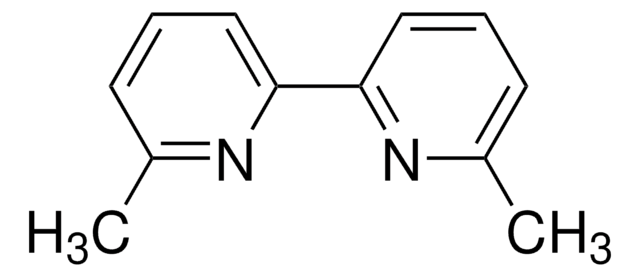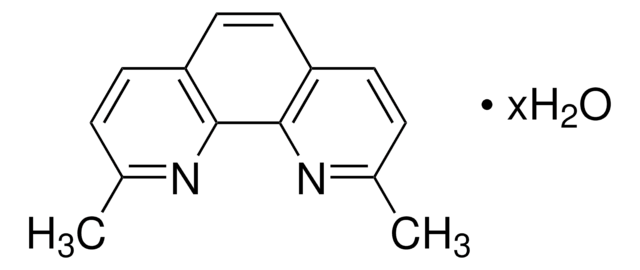140910
Bathocuproine
96%
Synonym(s):
2,9-Dimethyl-4,7-diphenyl-1,10-phenanthroline, BCP
About This Item
Recommended Products
Assay
96%
form
powder
greener alternative product characteristics
Design for Energy Efficiency
Learn more about the Principles of Green Chemistry.
sustainability
Greener Alternative Product
mp
279-283 °C (lit.)
λmax
~280 nm in methanol
Orbital energy
HOMO 7 eV
LUMO 3.5 eV
OLED Device Performance
ITO/CuPc/NPD/TCTA/mCP:FIrpic (6%)/BCP/LiF/Al
ITO/NPD/CBP:Ir(ppy)3/BCP/Alq3/Mg:Al
ITO/NPD/TCTA/BCPO:Ir(piq)3 (7-8%)/BCP/Alq3/LiF/Al
ITO/NPD/TCTA/BCPO:Ir(ppy)3 (7-8%)/BCP/Alq3/LiF/Al
greener alternative category
, Enabling
SMILES string
Cc1cc(-c2ccccc2)c3ccc4c(cc(C)nc4c3n1)-c5ccccc5
InChI
1S/C26H20N2/c1-17-15-23(19-9-5-3-6-10-19)21-13-14-22-24(20-11-7-4-8-12-20)16-18(2)28-26(22)25(21)27-17/h3-16H,1-2H3
InChI key
STTGYIUESPWXOW-UHFFFAOYSA-N
Looking for similar products? Visit Product Comparison Guide
General description
Application
Signal Word
Warning
Hazard Statements
Precautionary Statements
Hazard Classifications
Acute Tox. 4 Oral - Aquatic Chronic 4
Storage Class Code
11 - Combustible Solids
WGK
WGK 3
Flash Point(F)
Not applicable
Flash Point(C)
Not applicable
Personal Protective Equipment
Certificates of Analysis (COA)
Search for Certificates of Analysis (COA) by entering the products Lot/Batch Number. Lot and Batch Numbers can be found on a product’s label following the words ‘Lot’ or ‘Batch’.
Already Own This Product?
Find documentation for the products that you have recently purchased in the Document Library.
Customers Also Viewed
Articles
Professor Shinar (Iowa State University, USA) summarizes the developments of a variety of sensor configurations based on organic and hybrid electronics, as low-cost, disposable, non-invasive, wearable bioelectronics for healthcare.
Professor Chen (Nankai University, China) and his team explain the strategies behind their recent record-breaking organic solar cells, reaching a power conversion efficiency of 17.3%.
Our team of scientists has experience in all areas of research including Life Science, Material Science, Chemical Synthesis, Chromatography, Analytical and many others.
Contact Technical Service



![[6,6]-Phenyl C61 butyric acid methyl ester >99.5%](/deepweb/assets/sigmaaldrich/product/structures/359/221/d990c746-0960-4c69-bf76-fe09b193824d/640/d990c746-0960-4c69-bf76-fe09b193824d.png)





